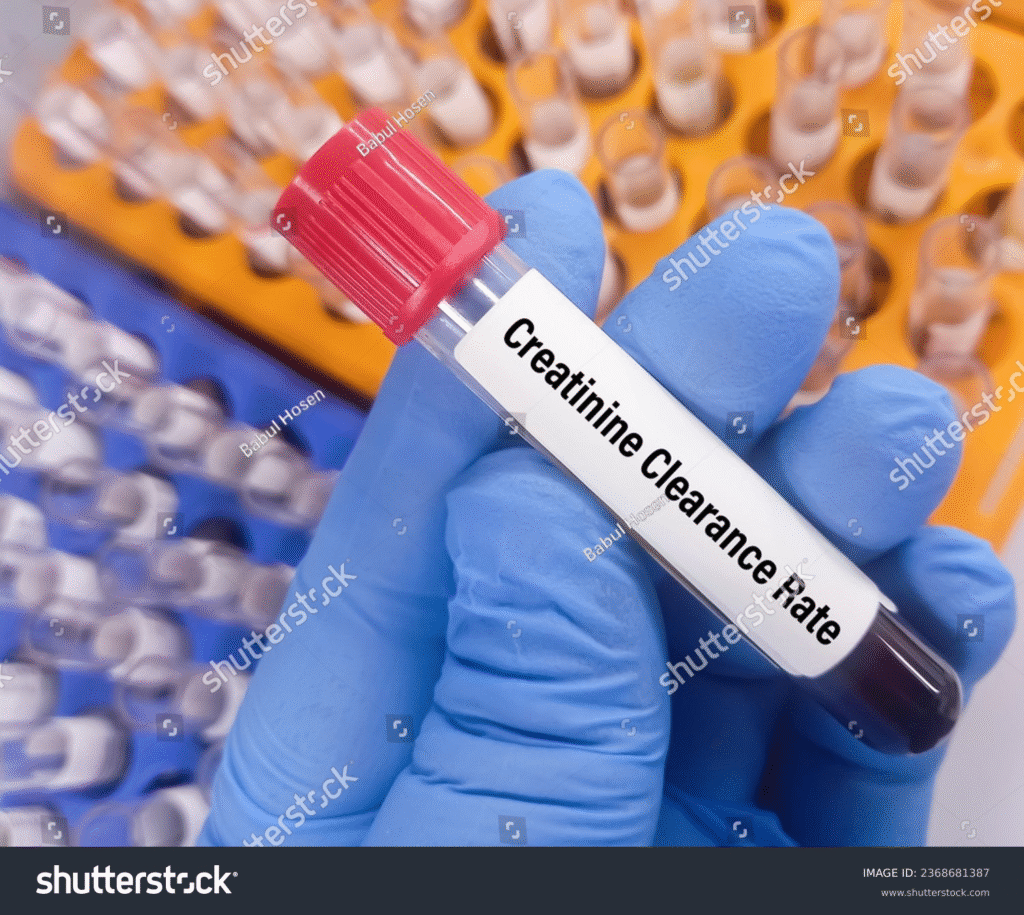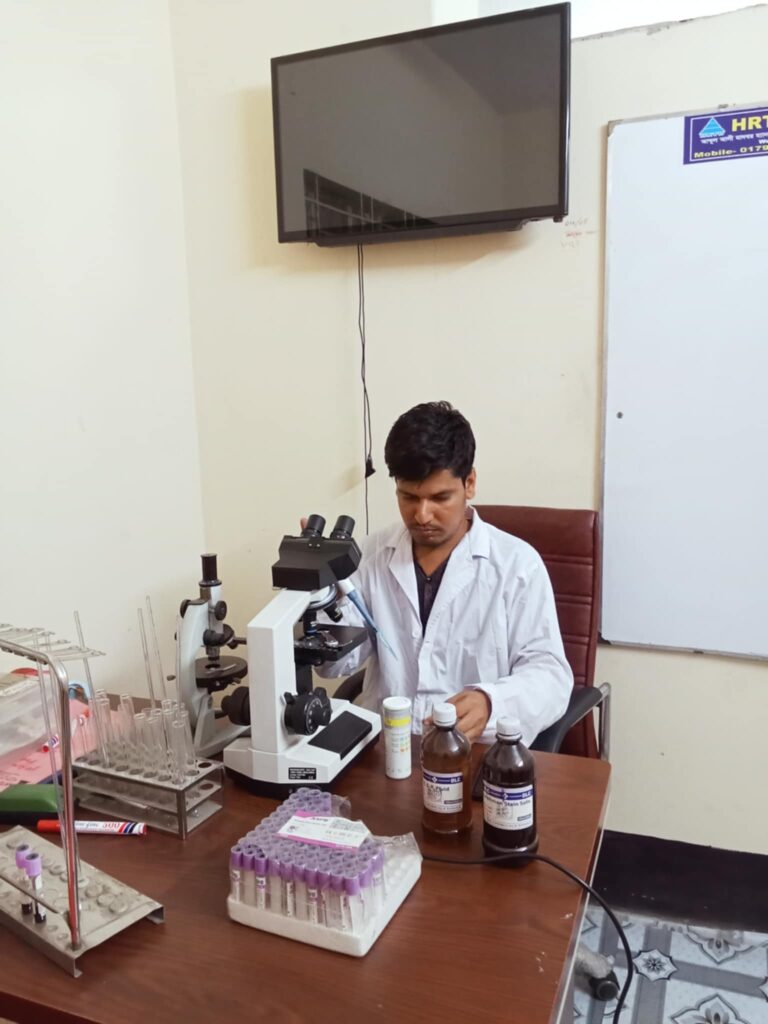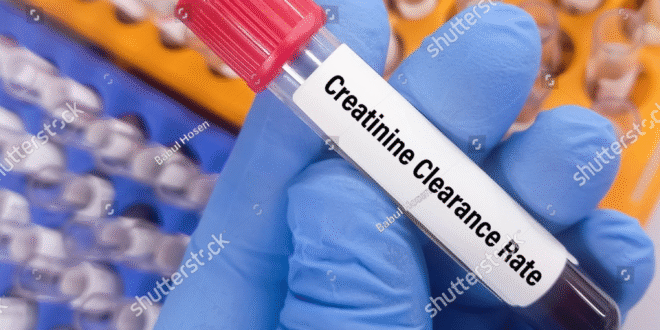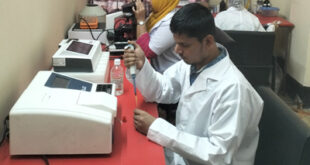Creatinine Clearance Rate Test Provided by HRTD Medical Institute – Excellence in Diagnostic Healthcare

1. Introduction to Creatinine Clearance Rate (CCR)
The Creatinine Clearance Rate (CCR) test is a widely used diagnostic tool for assessing kidney function, particularly the efficiency with which the kidneys filter waste products from the blood. It helps determine the glomerular filtration rate (GFR)—a key indicator of renal health. At HRTD Medical Institute, located in Mirpur-10, Dhaka, we offer highly accurate and reliable Creatinine Clearance Rate testing using advanced laboratory technology and experienced medical staff.
The Creatinine Clearance Rate test measures the volume of blood plasma cleared of creatinine per unit time, usually expressed in milliliters per minute (mL/min). Creatinine itself is a waste product formed by the breakdown of creatine phosphate in muscle tissue and is excreted almost entirely by the kidneys. Because the body produces creatinine at a relatively constant rate, and the kidneys filter it with minimal reabsorption, creatinine clearance is a reliable indicator of renal filtration capacity.
2. Understanding Creatinine and Its Role in the Body
2.1 What is Creatinine?
Creatinine is a chemical compound generated during the normal breakdown of muscle tissue. It is a byproduct of creatine metabolism, which plays an essential role in supplying energy to muscle cells.
Key points:
- Produced at a fairly constant rate depending on muscle mass.
- Found in the bloodstream and eliminated almost entirely through the kidneys.
- Minimal reabsorption occurs in the renal tubules, making it an excellent marker for kidney function testing.
2.2 Creatinine Levels in the Blood
Normal serum creatinine levels vary according to:
- Age: Older adults generally have lower levels due to reduced muscle mass.
- Sex: Males often have higher creatinine levels than females.
- Muscle mass: Athletes may have higher baseline creatinine.

3. Purpose of the Creatinine Clearance Rate Test
The Creatinine Clearance Rate test provides a quantitative measure of kidney filtration efficiency. At HRTD Medical Institute, physicians recommend this test to:
- Evaluate kidney function in patients with suspected renal disease.
- Monitor progression of chronic kidney disease (CKD).
- Assess effectiveness of treatments affecting kidney function.
- Adjust medication dosages that are cleared by the kidneys.
- Detect early kidney damage in high-risk patients (e.g., diabetics, hypertensives).
4. How Creatinine Clearance Rate Relates to GFR
Glomerular filtration rate (GFR) is the volume of fluid filtered by the glomeruli per minute. Creatinine clearance is used as a surrogate marker for GFR because:
- Creatinine is freely filtered at the glomerulus.
- There is little to no reabsorption.
- Only a small amount is secreted by renal tubules.
While CCR may slightly overestimate GFR due to tubular secretion, it remains a valuable and widely accepted clinical measure.

5. Indications for Creatinine Clearance Rate Testing
Doctors at HRTD Medical Institute may recommend Creatinine Clearance Rate testing if a patient has:
- Symptoms of kidney dysfunction (e.g., swelling, fatigue, changes in urination).
- Elevated blood creatinine levels in routine blood work.
- Risk factors for kidney disease:
- Diabetes mellitus
- Hypertension
- Cardiovascular disease
- Family history of kidney problems
- The need for accurate renal function assessment before major surgery.
- The requirement for precise drug dosing for medications cleared by the kidneys.
6. Preparation for the Creatinine Clearance Rate Test
6.1 Patient Instructions
Before undergoing a Creatinine Clearance Rate test at HRTD Medical Institute, patients are advised to:
- Avoid heavy exercise 24 hours prior to the test (to prevent artificially high creatinine levels).
- Refrain from eating excessive meat, which can temporarily raise creatinine levels.
- Inform the physician of any medications, as some may influence test results (e.g., cimetidine, trimethoprim).
- Drink adequate fluids but avoid excessive water intake before urine collection.
7. Methods of Performing the Creatinine Clearance Rate Test
There are two main approaches to measuring CCR:
7.1 24-Hour Urine Collection and Serum Creatinine Measurement
This is the gold standard method used at HRTD Medical Institute.
Steps:
- Patient collects all urine for 24 hours in a provided container.
- A blood sample is drawn during or after the urine collection period to measure serum creatinine.
- Creatinine Clearance Rate is calculated using the formula:
Creatinine Clearance Rate =(Urine creatinine concentration × Urine volume)Serum creatinine concentration × Collection time (in minutes)CCR = \frac{\text{(Urine creatinine concentration × Urine volume)}}{\text{Serum creatinine concentration × Collection time (in minutes)}}CCR=Serum creatinine concentration × Collection time (in minutes)(Urine creatinine concentration × Urine volume)
7.2 Estimated Creatinine Clearance Using Equations
When urine collection is impractical, CCR can be estimated using formulas:
Cockcroft-Gault Formula: CCR=(140−Age in years)×Weight in kg×KSerum creatinine in mg/dLCCR = \frac{(140 – \text{Age in years}) \times \text{Weight in kg} \times K}{\text{Serum creatinine in mg/dL}}CCR=Serum creatinine in mg/dL(140−Age in years)×Weight in kg×K
Where K = 1.23 for men, 1.04 for women.
MDRD and CKD-EPI Equations:
Primarily used for estimating GFR, adjusted for age, sex, and race.
8. Normal Reference Ranges
At HRTD Medical Institute, reference values for Creatinine Clearance Rate are:
- Men: 97–137 mL/min
- Women: 88–128 mL/min
However, values may vary slightly between laboratories depending on measurement techniques.
9. Interpretation of Results
9.1 Low Creatinine Clearance Rate
Indicates reduced kidney filtration capacity, possibly due to:
- Chronic kidney disease
- Acute kidney injury
- Glomerulonephritis
- Severe dehydration
- Heart failure
9.2 High Creatinine Clearance Rate
Possible causes:
- Pregnancy (increased GFR)
- High protein diet
- Vigorous exercise
- Early diabetic nephropathy
10. Factors Affecting Creatinine Clearance Rate Results
Several conditions can influence test results:
- Age: CCR decreases naturally with age.
- Body size/muscle mass: Larger individuals may have higher CCR.
- Diet: High-protein meals can increase creatinine temporarily.
- Medications: Some drugs interfere with creatinine secretion or measurement.
- Hydration status: Dehydration reduces clearance values.
11. Limitations and Sources of Error
Although CCR is highly useful, certain limitations exist:
- Overestimation of GFR due to tubular secretion of creatinine.
- Inaccurate 24-hour urine collection can skew results.
- Dietary influences and temporary physiological changes can cause fluctuations.
12. Creatinine Clearance Rate in Clinical Practice
At HRTD Medical Institute, CCR testing plays a vital role in:
- Detecting early kidney disease before symptoms appear.
- Monitoring disease progression in chronic kidney disease patients.
- Guiding safe drug dosing for antibiotics, chemotherapy agents, and other renally cleared drugs.
- Evaluating kidney function before major surgeries.
13. Creatinine Clearance Rate Testing at HRTD Medical Institute
13.1 Why Choose Us?
- State-of-the-art laboratory equipment for accurate measurement.
- Experienced medical technologists trained in precision testing.
- Quick turnaround time for results.
- Consultation services with nephrologists and internal medicine specialists.
- Convenient location in Mirpur-10, Dhaka with easy accessibility.
13.2 Patient Care Commitment
We believe in patient education, ensuring you understand:
- What the Creatinine Clearance Rate test measures.
- Why it’s important.
- How to interpret the results for your health decisions.
Creatinine Clearance Rate (CCR) – Frequently Asked Questions
1. What is Creatinine Clearance Rate (CCR)?
Creatinine Clearance Rate is a measurement that estimates how well your kidneys are filtering creatinine from your blood. It helps assess kidney function and detect possible kidney diseases.
2. Why is CCR important?
CCR is a key indicator of the glomerular filtration rate (GFR), which reflects overall kidney health. Abnormal results may point to kidney damage, chronic kidney disease, or other health conditions affecting kidney function.
3. How is the Creatinine Clearance Rate test performed?
The test usually involves:
- Blood sample – to measure creatinine levels in the blood.
- 24-hour urine collection – to measure creatinine excreted in urine.
The results are combined in a formula to calculate CCR.
4. Do I need to prepare for the Creatinine Clearance Rate test?
Yes. Your doctor may advise:
- Avoiding high-protein meals before the test.
- Staying hydrated but not over-drinking.
- Avoiding intense exercise before the urine collection.
- Informing your doctor about medications you take, as some affect results.
5. What are normal CCR values?
- Men: ~97–137 mL/min
- Women: ~88–128 mL/min
Values may vary depending on age, muscle mass, and lab methods.
6. What does a low CCR mean?
A low CCR can indicate:
- Chronic kidney disease (CKD)
- Kidney infection or injury
- Reduced blood flow to kidneys
- Certain systemic diseases (e.g., diabetes, hypertension)
7. What does a high CCR mean?
High CCR is less common but may occur in:
- Pregnancy
- High-protein diet
- Very high muscle mass
- Certain medications
8. Is CCR the same as eGFR?
No. eGFR is an estimated kidney filtration rate calculated from blood creatinine, age, sex, and body size. CCR directly measures creatinine excretion using both blood and urine samples, making it more accurate in some cases.
9. How often should I test my CCR?
- If you have normal kidney health, you might only test when symptoms or risks appear.
- If you have kidney disease, diabetes, or hypertension, your doctor may recommend regular monitoring.
10. Are there any risks in the Creatinine Clearance Rate test?
- Blood sample: mild discomfort or bruising at the needle site.
- Urine collection: no physical risk, but accurate timing and collection are important for reliable results.
11. Can diet or lifestyle affect CCR results?
Yes. High protein intake, dehydration, excessive exercise, or certain supplements can temporarily change creatinine levels, affecting CCR results.
12. When should I consult a doctor about Creatinine Clearance Rate ?
You should see your doctor if:
- Your CCR result is outside the normal range.
- You have symptoms like swelling, fatigue, reduced urination, or foamy urine.
- You have chronic conditions that can affect the kidneys.
14. Conclusion
The Creatinine Clearance Rate (CCR) test remains one of the most effective methods for assessing kidney function, offering valuable insights into glomerular filtration efficiency. At HRTD Medical Institute, we combine advanced technology, skilled professionals, and patient-centered care to ensure that every Creatinine Clearance Rate test is performed with accuracy and compassion.
Regular kidney function monitoring is essential—especially for individuals with chronic illnesses or at risk for kidney disease. With the Creatinine Clearance Rate test, healthcare providers can detect problems early, initiate timely treatment, and improve long-term health outcomes.
 Pathology Training Institute in Bangladesh Best Pathology Training Institute in Bangladesh
Pathology Training Institute in Bangladesh Best Pathology Training Institute in Bangladesh


